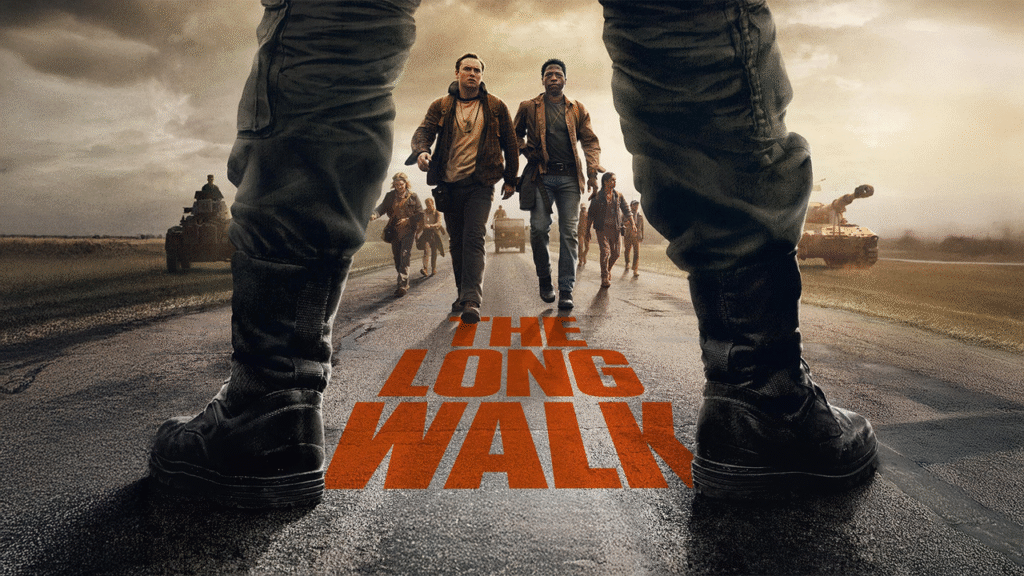Welcome to the Death March Lottery
The Long Walk (2025) is a haunting adaptation of Stephen King’s early dystopian novella, finally brought to the screen by director Francis Lawrence. If you’ve never read the book, go in blind. That’s the best way to experience the movie’s slow-burning tension, emotional gut punches, and existential horror. The premise? Fifty teenage boys are chosen by lottery to compete in a high-stakes walking contest. Fall below 3 mph? You get shot. The last one standing wins anything he wants.
One Long Walk, No Finish Line
This is not an action film. It’s a psychological horror disguised as a sci-fi survival thriller. The film unfolds in real-time, primarily focusing on a core group of four “musketeers” as they bond, break, and emotionally bury one another. There’s little exposition, no flashbacks, and a total commitment to its central, singular ordeal. It’s about endurance—for the characters and the audience.
Carried by Two Powerhouse Leads
Cooper Hoffman (Raymond Garraty) and David Jonsson (Peter McVries) absolutely carry the film. Hoffman plays the reluctant hero, torn emotionally and physically. Jonsson brings the fire as McVries, a scarred orphan with a tragic past and an unwavering will to find meaning in madness. Their chemistry and emotional arcs keep the movie compelling even when the pace slows.
Mark Hamill, as the enigmatic Major, feels underused. He’s not as menacing or mysterious as the film suggests, but he serves his purpose. The rest of the ensemble offers solid background color—from the idealistic nerd to the delusional bully to the stoic loner who eventually breaks.
What Works: Brotherhood, Brutality & Bare-Bones Storytelling
- Minimalist setup that respects the audience
- Strong emotional performances from the leads
- Effective tension and pacing in the second half
- Real-time deterioration of the body and psyche
- Stark, unflinching violence
- Some great one-off side characters
What Doesn’t Work: Hazy Worldbuilding & a Murky Climax
- Limited exploration of the dystopian world
- Some deaths are glossed over or cut away
- The ending walks a tightrope between poetic and confusing
- Underwhelming use of Mark Hamill as the Major
- Leaves big questions about rebellion, the system, and the future unanswered
TheBigBois Reactions
Zach loved the emotional intensity and thought it was one of the better Stephen King adaptations in years. Alex thought it dragged in parts, had a weak ending, and lacked environmental detail. Dustin praised the acting but found the world underdeveloped and the logic of the system shaky.
All agreed: it’s heavy, it’s bleak, and it lingers.
Spoiler Section (⚠️): One Winner, No Mercy
- The boys are chosen by a literal lottery.
- Rules are simple: maintain 3 mph, stay on the road, don’t attack the guards.
- Violators get three warnings. Then they’re executed.
- The deaths range from gut-wrenching to quick and silent.
- The four main boys form a bond, but slowly drop out one by one.
- McVries saves Ray at the cost of his own life.
- Ray wins in the book. In the film, McVries wins, but he uses Ray’s wish: he asks for a rifle and shoots the Major.
- The final moments are ambiguous. Did McVries die? Did he spark rebellion? Is he just walking into madness?
Should You Watch It?
Yes, if you’re in the mood for something slow, thoughtful, and emotionally intense. No, if you’re expecting action, explosions, or Hunger Games-style spectacle. This is pure, distilled psychological horror and character drama.
A March into Madness
The Long Walk doesn’t answer all your questions. It doesn’t want to. It puts you in a horrific system and asks you to endure, just like its characters. The minimalism works. The emotion lands. But its ambiguity might frustrate some viewers.
The Long Walk: Bleak, brutal, and beautiful in its own way. A powerful adaptation that trusts its audience to walk the long road without hand-holding. – Asmodeus

